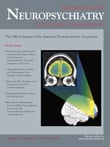To the Editor: Theory of Mind is the ability to attribute mental states to others, a key aspect of social cognition that permits the understanding and prediction of others’ behavior. Prior attempts to delineate its brain instantiation mainly involved specifically dedicated midline structures;
1 in contrast, other lines of research emphasize the role of shared circuits for mentalizing about one’s own experiences and those of others.
2 Dementia is a neurodegenerative disorder manifested by diverse cognitive and behavioral symptoms. Early diagnosis markers are of vast interest, with increasing emphasis placed on differential neuropsychological profiles.
We assessed Theory of Mind in five patients with different types of cognitive impairment in a mild stage: mild cognitive impairment, Alzheimer’s disease, vascular dementia, frontal variant frontotemporal dementia, dementia with Lewy bodies, and a healthy comparison subjects.
The Theory of Mind battery included: First and Second Order false belief tasks (attributing mental states to a character in a short story), the Reading the Mind in the Eyes test (detecting mental and emotional states from different characters’ eye-region photographs), and the Faux Pas test (detecting a socially incorrect behavior without intentionality), all previously used in dementia and proved of good use.
3 Memory was controlled to minimize interference.
Case Studies
The healthy comparison subject was a 75-year-old man with a Mini-Mental State Examination Score (MMSE) of 30/30. His Theory of Mind performance was normal. In comparison, all of the patients had lower scores.
The patient with Alzheimer’s disease was a 75-year-old woman with an MMSE score of 27/30. Her Theory of Mind scores were slightly below normal on Second Order false belief tasks, as her responses were hampered by memory demands, but she performed correctly on the higher order tasks (Reading the Mind in the Eyes and Faux Pas tests). No specific Theory of Mind deficit was concluded. The mild cognitive impairment patient (a 75-year-old woman with MMSE 25/30) performed similarly, with lower scores on the Second Order task (i.e., she could not recall the character’s name) attributable to memory impairment.
The frontal variant frontotemporal dementia patient (a 64-year-old man) showed a clear Theory of Mind deficit, failing in all tasks despite a similar MMSE score (27/30). Errors were based on misattributing beliefs, assuming intentionality in comments that could hurt somebody else’s feelings, and attributing wrong emotions to eye expressions. Memory was unlikely the cause since, in contrast to the patients with Alzheimer’s disease and mild cognitive impairment, he always remembered the story and the characters’ names.
The dementia with Lewy bodies patient (a 72-year-old woman with MMSE score of 24/30) and the vascular dementia patient (a 68-year-old man with MMSE score of 29/30) also performed worse than the patients with Alzheimer’s disease and mild cognitive impairment, though better than the frontal variant frontotemporal dementia patient. Being the first study to assess their mentalizing abilities, a comparison with previous findings is not possible. However, the patients’ impairment seems to be related to the affected brain areas: the medial prefrontal cortex and its networks.
Discussion
We provide new insights into the nature of mentalizing profiles in different early stage dementias. Being a clearly insufficient function in frontal patients and possibly accounting for their early symptoms of social inappropriateness, prior evidence of medial prefrontal structures subserving Theory of Mind is supported.
4 In patients with Alzheimer’s disease and mild cognitive impairment, it is possible that Theory of Mind deficits are secondary to their primary memory impairment, as suggested by previous research.
5
